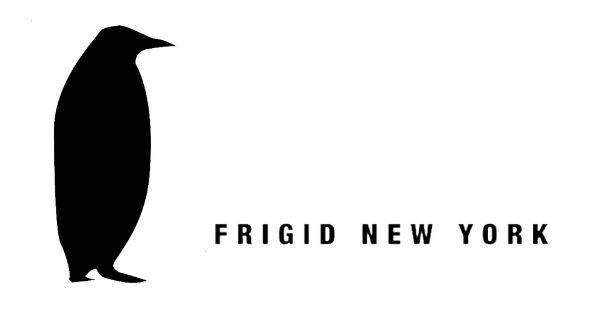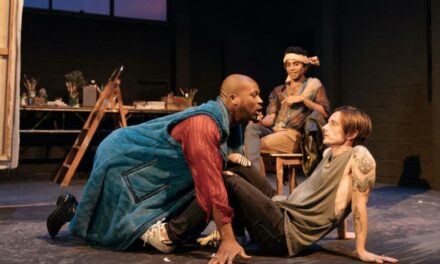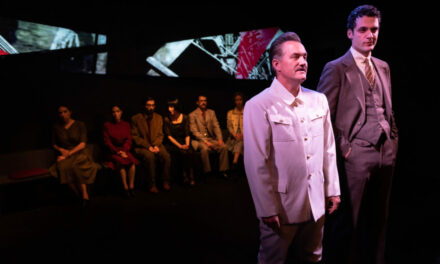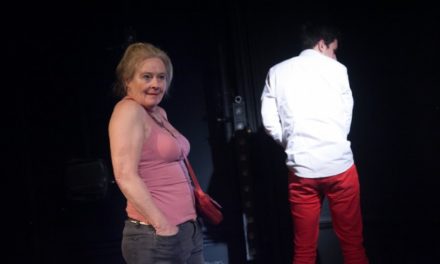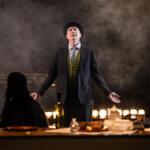2024’s New York City Fringe has come to an end, eighteen nights of shows enjoyable, waspish, querying, high-caliber, and searching (on occasion, all things all at once). I had the privilege of attending eight of these shows; I’ve been itching to share my thoughts.

The Leading Lady Club, written by Sarah Hogewood. PC: Leading Lady Creative
The Leading Lady Club: Created by actor and writer Sarah Hogewood, and inspired by interviews with a diverse array of women, this feminist sketch comedy is described as “the Barbie movie meets SNL.” Add in more than a requisite dash of darkness, and I’d judge that descriptor as true. Hogewood and the three actors accompanying her—Nancy Umba, Asha Devi, and Katherine Winter, all beautifully commanding—succeed in crafting a satire that feels not like feminine proselytization, but instead is catharsis and challenge disguised as romp. Whipsmart comedy disarms their audience; in turn, they deliver earned gut punches in their discussions of sexual assault, workplace harassment, harmful archetype, and performative activism. As a female in this industry, I felt my own voice heard amongst the cacophony. Hogewood’s creation and the vulnerability it was born from will continue to be a gift that keeps on giving, I’m sure.

Kristen Hoffman (L) and Penelope Deen in “Climate Fables: Debating Extinction.” PC: FRIGID New York
Climate Fables: Debating Extinction: The Torch Ensemble’s dystopia—surrounding a group of three in the isolation of climate disaster, one believing in human death, one believing in human birth, one unsure of the balance—was my favorite production of the festival. I do not exaggerate when I say that this play lingers in my mind, still. The story, written by Padraig Bond, strikes that fragile balance of politic and personal: the devastation of climate acts as deuteragonist, a constant companion to the battle of morality, family, and love the three characters face. Dialogue and monologue intertwine in ways organic yet philosophical. Despite those (very true) compliments, though, it is not the script that sticks with me. It is the sheer skill of this ensemble of actors. I can only describe the work of Penelope Deen, Kristen Hoffman, and Bond himself as sorcery. Deen’s visceral connection, Hoffman’s otherworldly grounding, Bond’s natural carriage, all combine to present a world so compelling it felt like magic. My heart dropped with them, my mind worked with them, and I left the theatre shaking in the best of ways. A masterpiece.

Lindsey M.E. Newton in “The House of Clytemnestra.” PC: FRIGID New York
The House of Clytemnestra: As a lifelong lover of mythos and a practitioner of feminist retellings myself, I was thrilled to see this title emerge. And, by and large, it did not disappoint. Creator Zoe Bloomfield’s adaptation, told entirely from the feminine perspective, is marvelously well-written, the poetry of ancient Greek epics married with modern conceits. This juxtaposition results in wondrous exchanges between god and human, between human and self, between trauma and survival. Lindsey M.E. Newton shines as the titular anti-heroine: her ability to balance suffering-induced evil with heart-breaking rationality results in a Clytemnestra one can’t help but empathize with. Similarly, Danica Jensen finds an easeful complexity in Elektra, daughter matching mother in compelling performance. My only complaint? The play is far too short to contain all it wants to explore. Without an act break or a marked passage of time, the sudden appearance of Elektra and Orestes makes this adaptation feel too long and disjointed; somewhat counterintuitively, allowing for more time to earn those new additions would be just right, I believe. To that end, I’m excited to see where this play goes!

Peter Kiesewalter and Whitney La Grange of “The Moth Project.” PC: Stephen Kalogridis
The Moth Project: The best way to describe this multimedia experience is, in my opinion, that of a DJ giving a TED Talk. Created and performed by composer Peter Kiesewalter and violinist Whitney La Grange, this amalgam of projection, classical and electronic music, rock ‘n’ roll, poetry, biology, anthropology, and memoir utilizes the moth’s many species to explore why we, as humans, behave the way we do. Mass migration and survival is mirrored by adrenaline and self-destruction; family and love is met with loss and memory. Walking into that pure white production room, I wasn’t sure what to anticipate. It certainly wasn’t being as touched as I was by such a mixture. It’s clever, it’s wise, it’s so very human. Kudos to Kiesewalter and La Grange and all their moths.

Jeannie Skelly (L), Eve Blackwater, and Kendra MacDevitt of “The Brokeneck Girls.” PC: Adrian Buckmaster
Brokeneck Girls: The Murder Ballad Musical: The first thought to strike me upon entering the in media res saloon of Brokeneck? My god, that costuming is remarkable. Tiffany Rae Knight’s steampunk-adjacent Wild West designs were divine, providing atmospheric interest and subliminal character messaging with ease, so much so that their impact was immediately noticeable. And thus began a night of delving into cultural history. The nostalgia of Americana unveils its entwinement with a dark fascination of women killed and killers: the Brokeneck Girls—consisting of guitarist and playwright Eve Blackwater, fiddler Kendra MacDevitt, and banjoist Jeannie Skelly—take their audience through a musical catalogue from “Pretty Polly” to “Knoxville Girl.” In each, blood is spilled. In each, crimson drenches the woman; that drenching could be from either side. Between the songstresses’ tales, Babs (Olivia Whicheloe), Lady Arlin (Alexandria Thomas), and The Sheriff (Emily Ross) flit in and out. I so wish the actors had been utilized for more than simple transitions: as it was, their characters felt somehow convoluted and oversimplified, made obsolete by the band’s necessity to play. That said, this musical shows promise. If Blackwater’s book can match the genius of the music, she’ll have an excellent play on her hands.

Professor M (L) and Queerly Femmetastic of “Flossy Follies.” PC: Desiree De Sade
Flossy Follies: The Yee-Haw Agenda: Revolution found in joy and celebration. That is what Queerly Femmetastic and Professor M’s burlesque presented to their audiences. From the first proclamation—“I believe in education and tits at the same time!”—it was clear that this show would be a marriage of learning and freedom. Follies’ line-up of performers, each, provided an unapologetic celebration of Blackness and queerness found within the culture of the American West; in between, Queerly Femmetastic’s joyous confrontation of appropriation, racism, and dark history gave the knowledge the night needed to properly revolutionize. I was fascinated. I couldn’t stop smiling, whooping, engaging with the performers. It was a delight of a night. I so hope to see another of their performances.

“Solitary” by Seán Griffin. PC: FRIGID New York
Solitary: The only solo show I attended of this year’s Fringe, playwright Seán Griffin’s Solitary is thirty minutes of thought and empathy. Following a man placed in solitary confinement, in the moments after his mouse friend doesn’t show up for dinner, the script is as beautifully simple as just: humanization. The audience never learns why Griffin’s protagonist (Sammy, played by Casimir Gregory) is in solitary, or why he’s in prison at all; I appreciated that lack. Sammy talks, instead, of his family and his loved ones, sings his favorite music to drown out the shrieks of other cells, panics and throws his bedding and apologizes to the as-yet-unseen mouse for doing so. He is not “the prisoner.” He is a man, a human going through an incredibly traumatizing experience. Griffin’s addition of constant sound—true sound, recorded in the solitary confinement wing of a prison in Maine—adds utmost pathos to an already wrenching story: it’s enough to make a person go insane themselves, sitting in the screams and the banging for 30 minutes; it’s difficult to imagine a human living in that for months on end. Gregory embodies that fight for sanity well, and endears his audience to him with immediacy. Compelling and impactful in a short span of time, this play would pair well with abolitionist literature.

Gracie Rittenberg in “A Little Less Than Kind.” PC: Blue Bird Theatre Co.
A Little Less Than Kind: Gracie Rittenberg’s retelling of Hamlet places the titular tragedian in the land of Silicon Valley, appearing as Hannah, the trenchant, bisexual heir apparent to the tech throne. Her mother is dead of swimming pool drowning, her father has remarried her Kardashian-like aunt, her on-again-off-again girlfriend can’t seem to understand, and her gay best friend has just had a run-in with the ghostly impossible. From there, the tale unfolds much as one would expect from Shakespeare’s classic, simply with a flipped gender dynamic and a multitude of sardonic Silicon jokes. This is where, unfortunately, the adaptation fell flat for me. Rittenberg’s premise promised an exploration of gender and sexuality, of mother and daughter, of family trauma. This script adds nothing to what the original Hamlet already provides; in fact, Hannah’s supposed bisexuality was nowhere to be seen, and all characters outside the triad (Hamlet, Ophelia, Horatio) felt vapid and under-developed. The audience had a laugh of a time, I can say, and the sound design was excellent. Alas, it simply did not live up to its promise.
To follow these shows (and many more!), visit FRIGID New York.
This post was written by the author in their personal capacity.The opinions expressed in this article are the author’s own and do not reflect the view of The Theatre Times, their staff or collaborators.
This post was written by Rhiannon Ling.
The views expressed here belong to the author and do not necessarily reflect our views and opinions.

